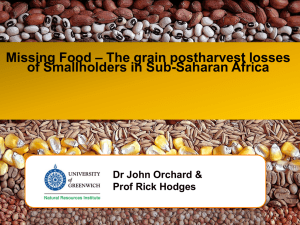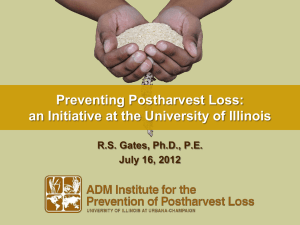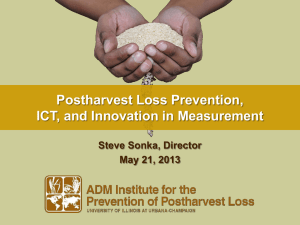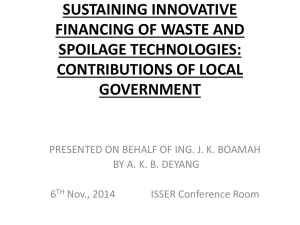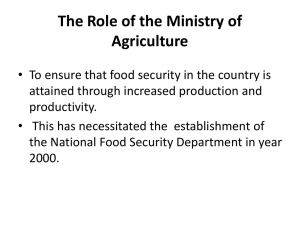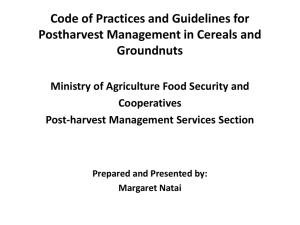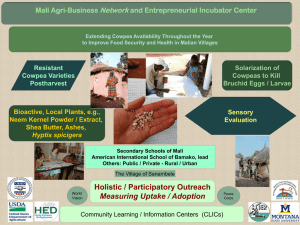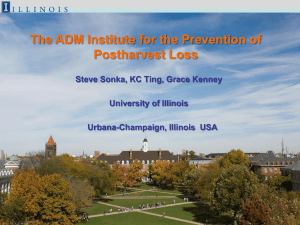Errata - The First International Congress on Postharvest Loss
advertisement
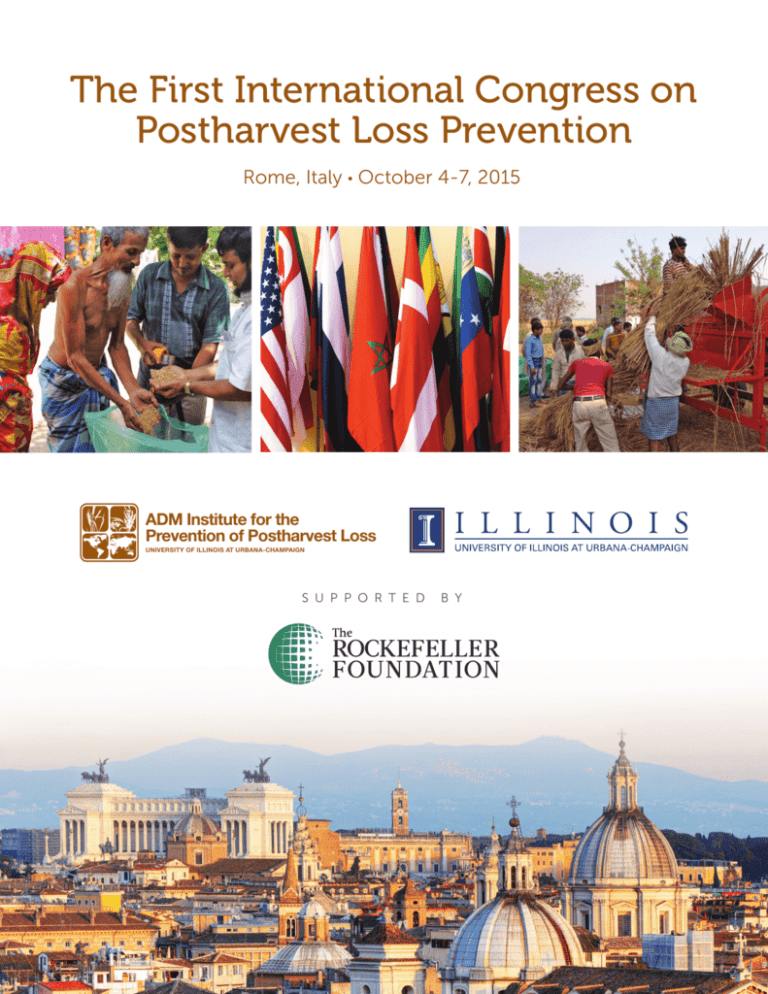
The First International Congress on Postharvest Loss Prevention Rome, Italy • October 4-7, 2015 ADM Institute for the Prevention of Postharvest Loss UNIVERSITY OF ILLINOIS AT URBANA-CHAMPAIGN S U P P O R T E D Rome, Italy • October 4-7, 2015 B Y Errata There were a few errors in the initial printed program and some changes were made at the Congress. The following are the corrections. General: • • On the planning committee list (page 4) Dr. Usha Barwale-Zehr’s title with Mahyco should be Chief Technology Officer. On Page 17, regarding the banquet dinner, Mr. Mark von Pentz’s title should be President, John Deere Agriculture and Turf Division – Europe, CIS, Asia, Africa and Global Tractor Platform. The name of the no-till planter on display is the John Deere 1025 2-row no-till planter. Technical Sessions: Monday, October 5, 2015 • • • In Concurrent Session B, the keynote speaker was Mr. Fujun Li, who agreed to fill the slot of Mrs. Anne Mbaabu, who was unable at the last moment to attend. Mr. Li is was originally scheduled as a Tuesday opening speaker. Dr. R.K. Mittal, Rajendra Agricultural University, India, presented in place of Dr. Joseph Sherman-Kamara at 12:05 p.m. in Session B. His presentation was titled, “Overview of Post Harvest Losses and Its Implications in India”. In Concurrent Session C, Dr. Corinne Alexander, Purdue University, USA, replaced Dr. Jess Lowenberg-DeBoer as session chair and as the second presenter in the session at 2:50 p.m. Dr. Toine Timmermans, Wageningen University, replaced Dr. Girma Demissie Bekele at 2:35 p.m. in Session C. His presentation was titled “Food Loss & Waste Protocol”. In Poster Session P1B, Michael Adedotun Oke and Adebola Adedugbe were unable to attend. Tuesday, October 6, 2015 • • • • • • Mr. Fujun Li’s presentation was rescheduled as discussed earlier. He presented his keynote in Session B. In poster session P2B, the session chair was Olivia Karanja of the Rockefeller Foundation. Mr. Mitchell Meier presented in place of Mr. David Blumberg for Blumberg Grain. Concurrent Session F was chaired by Dr. R.K. Mittal, Rajendra Agricultural University, India. Concurrent Session G was chaired by Dr. John Bowman, USAID. The correct title of Dr. Dirk Maier’s keynote presentation in that session was “Intervention Strategies for the Reduction of Post-Harvest Loss – Case Studies” In poster session P3A, Mr. Antonio Acedo was unable to attend. Ilkay Dellal, Turkey, and Lizanne Wheeler, Postharvest Education Foundation, USA, were added to the poster session. In poster session P3B, Mr. Chukwudike Abraham and Ms. Helen Mant were unable to attend. Dr. Mireille Totobesola was unable to serve as session chair. Dieudonne Baributsa, Purdue University, USA, was added to this session with his poster presentation, “Reducing Post-Harvest Storage Losses to Improve Income and Food Security on Smallholder Farms” Welcome Prasanta Kalita Dirk E. Maier Of a world population of 7.3 billion in 2015, nearly 1 billion people face hunger today. This problem would magnify when global population increases as projected by 1 billion in the next 12 years and reach 9.6 billion by 2050. The global food supply will need to be increased by more than 50% by 2050 to meet the growing food demand. Additionally, the problem of food insecurity is compounded by the fact that 1/3 of the produced food is lost or wasted. Reducing food loss by reducing postharvest losses is not an option, but a necessity for meeting food demand of the growing world population in a sustainable environment. Postharvest loss reduction is a complex process that must be dealt within the context of different crops, cultures, economies, infrastructures, and climatic conditions among different countries as well as different regions within the same country. The First International Congress on Postharvest Loss Prevention is a unique event planned to provide a forum for various stakeholders to share, learn, and plan to develop action items for reducing postharvest losses. Along with major postharvest loss and reduction issues, this Congress aims to address various challenges and opportunities associated with postharvest losses within the framework of metrics and measurements that may enable development of better tools and interventions to reduce postharvest loss for smallholders in developing countries. At this first international Congress, we have representatives from public and private institutions, government organizations, philanthropic organizations, producers and industries, and others that share the same passion to improve the lives and livelihoods of our people on this planet. We offer sincere thanks and gratitude to each and every one of you for your active participation at this Congress. The first theme of the conference, Postharvest Loss Status & Emerging Issues, highlights losses occurring in various countries, their specific needs, and technical, social, and policy regulatory factors causing these losses. The presentations from the second theme, Intervention Strategies for PHL Mitigation, cover topics of innovative/ emerging postharvest technologies, farm mechanization and its effect on postharvest quality, economic assessment for sustainability of postharvest technologies, and critical stages in supply chain (focus of research). The PHL problem cannot be addressed and impact of interventions cannot be measured until losses are measured using scientific methods. The Measurement Methods & Metrics of PHL conference theme addresses tools and standards/protocols for postharvest quality and quantity loss assessment. The final theme of the conference, Education Platform and Decision Support System, focuses on the need to develop knowledge platforms and decision support systems, and discusses successful examples where effective tools and community 2 The First International Congress on Postharvest Loss Prevention participation proved beneficial. Our program is rich with eight keynote speakers, 42 oral presentations, and 78 posters in various themes. Additionally, we have renowned global leaders discussing global postharvest loss reduction issues and initiatives through panel discussions. The final outcome of the four-day Congress is targeted to result in a Roadmap for Global PHL Reduction as a shared vision of all participants on the complex problem and future direction to reduce postharvest losses. We sincerely thank all attendees for their participation and support. We sincerely thank the Archer Daniels Midland (ADM) Company for establishing the ADM Institute for the Prevention of Postharvest Loss and its support of this Congress. This program would not have come to fruition without the hard work and dedication of many individuals. We would like to thank all members of the Program, Planning, and Logistics committees. We would also extend special thanks to the ADM Institute staff. Without support, guidance, and inspiration from colleagues of the Food and Agriculture Organization (FAO) of the United Nations, the Rockefeller Foundation, the Bill & Melinda Gates Foundation, John Deere, United States Agency for International Development (USAID), University of Illinois at Urbana-Champaign, and the College of Agricultural, Consumer and Environmental Sciences (ACES) at the University of Illinois at UrbanaChampaign, this program would not have come together. We believe that all attendees of this Congress will enjoy the four-day meeting, make new connections, and develop and expand new or existing partnerships to build a stronger community to solve the challenges of postharvest loss. Dr. Prasanta Kalita Dr. Dirk E. Maier Congress Program Chair Conference Program Co-Chair DirectorProfessor ADM Institute for the Prevention Agricultural & Biosystems Engineering of Postharvest Loss Iowa State University University of Illinois at Urbana-Champaign Rome, Italy • October 4-7, 2015 3 Planning Committee Dr. Phyllis Wise, Committee Chair Professor University of Illinois at Urbana-Champaign Dr. Subbana Ayyappan Director General Indian Council of Agricultural Research Dr. Usha Barwale-Zehr Director, Office of Compliance and Ethics Mahyco Dr. Jose Cuesta Senior Economist World Bank Mr. Dennis Fisher Director, Office of Compliance and Ethics Archer Daniels Midland Company (ADM) Mr. C.D. Glin Associate Director The Rockefeller Foundation Dr. Elise Golan Director for Sustainable Development U.S. Department of Agriculture Dr. Robert Hauser Dean, College of Agricultural University of Illinois at Urbana-Champaign Consumer and Environmental Sciences Dr. Ahmed Kablan International Nutrition and Public Health, Research Advisor U.S. Agency for International Development Mr. Eric Luftman Director, Office of Agricultural Policy U.S. Department of State Ms. Charlene McKoin Senior Program Officer Bill and Melinda Gates Foundation Mr. Divine Njie Senior Officer UN Food and Agriculture Organization Ms. Victoria Podesta Vice President and Chief Communications Officer Archer Daniels Midland Company (ADM) Dr. Robert Zeigler Director General International Rice Research Institute Program Committee Dr. Prasanta Kalita, Committee Co-Chair Director of the ADM Institute for the Prevention of Postharvest Loss University of Illinois at Urbana-Champaign Mr. Tony Bennett Agro-Food Industries Group, Livestock Industry Officer UN Food and Agriculture Organization Dr. Dirk Maier, Committee Co-Chair Professor, Grain and Feed Operations and Processing Iowa State University Mr. Mike Cecava Research Director Archer Daniels Midland Company (ADM) Dr. K. Alagusundaram Deputy Director General, Agricultural Engineering Indian Council of Agricultural Research Dr. Ben Bennett Professor and Head of the Food and Markets Department University of Greenwich Natural Resources Institute 4 Dr. George Czapar Associate Dean and Director of Extension University of Illinois at Urbana-Champaign Ms. Amy Diggs Foreign Service Officer, Agriculture, Biotechnology, Textile Trade Affairs, Bureau of Economic and Business Affairs U.S. Department of Statea The First International Congress on Postharvest Loss Prevention Program Committee (continued) Dr. Xia Kang Professor Academy of State Administration of Grain Mr. Pradeep Khanna Associate Chancellor for Corporate and International Relations University of Illinois at Urbana-Champaign Dr. Lisa Kitinoja Founder The Postharvest Education Foundation Dr. Deepak Kumar Post-Doctoral Research Associate, ADM Institute for the Prevention of Postharvest Loss University of Illinois at Urbana-Champaign Ms. Anne Mbaabu Director, Market Access Program Alliance for a Green Revolution in Africa Dr. Neal Merchen Associate Dean for Research; College of Agricultural, Consumer and Environmental Sciences; Director, Experiment Station University of Illinois at Urbana-Champaign Dr. Elizabeth Mitcham Director, Postharvest Technology Center University of California – Davis; Department of Plant Sciences Dr. Suzanne Nielsen Professor and Faculty Fellow, Office of Corporate and Global Partnerships Purdue University Dr. Kathy Partlow Research and Grant Development Specialist University of Illinois at Urbana-Champaign Ms. Patrina Pink Communication and Partnerships Consultant Global Initiative on Food Loss and Waste Reduction, UN Food and Agriculture Organization Dr. Daniel Queiroz Department of Agricultural Engineering University of Vicosa Dr. Kent Rausch Associate Professor, Department of Agricultural and Biological Engineering University of Illinois at Urbana-Champaign Dr. Angela Records International Agricultural Research Advisor U.S. Agency for International Development Ms. Kai Robertson Lead Advisor, Food Loss and Waste Protocol World Resources Institute Mr. Eric Trachtenberg Director, Food and Agriculture Sector McLarty Associates Mr. Robert van Otterdijk Agro-industry Officer UN Food and Agriculture Organization Dr. Alex Winter-Nelson Director, Office of International Programs, College of Agricultural, Consumer and Environmental Sciences University of Illinois at Urbana-Champaign Logistics Committee Megan Puzey, Committee Co-chair Assistant Director Office of Corporate Relations Sarah Bingaman Schwartz Communications Coordinator ADM Institute for the Prevention of Postharvest Loss Kari Wozniak, Committee Co-chair Program Coordinator ADM Institute for the Prevention of Postharvest Loss Rome, Italy • October 4-7, 2015 5 Exhibition Room displays The World Food Programme (WFP) is the world’s largest humanitarian agency fighting hunger worldwide. By preventing the post-harvest losses of smallholder farmers WFP help decrease food waste, and increase the availability of food worldwide. This is a vital step toward meeting the world’s growing food needs, and is one of the pillars of the Zero Hunger Challenge. In Uganda, WFP has shown how improved on-farm storage structures – hermetic bags as well as metal and plastic silos – can dramatically reduce post-harvest losses at the farm level, when coupled with careful training. This is a critical entry point to minimizing food losses in the supply chain. In this exhibition, WFP demonstrates some of these affordable household storage solutions, which have helped thousands of farmers reduce their postharvest losses. On display are some of the drying equipment and hermetic storage options available to farmers supported by WFP in Uganda. Videos show beneficiary testimonials, as well as how metal silos are assembled by local artisans. The exhibition will also showcase the Blue Box – WFP’s food quality field testing kit – which contains grain sampling and grading equipment, aflatoxin test kit and other supplies to allow on-the-spot screening of food quality parameters and grading. 6 The lack of a comprehensive cold chain accounts for up to 200 million tonnes of postharvest food loss in emerging economies each year. Not only does this contribute to increased hunger and prices, but also represents a squandering of the labour, water and energy that go into its production. Dearman technology uniquely harnesses liquid air to provide zero-emission power and cooling, in order to deliver significant reductions in operating cost, fuel usage and emissions, at low capital cost. The first application to market will be a zeroemission transport refrigeration unit, providing a much-needed solution to sustainable cooling for food storage and distribution. Clean cold technology can help meet growing demand for cooling, enabling emerging economies to leapfrog the polluting fossil-fueled technology of the past. The ADM Institute is an information hub for evidence-based knowledge on postharvest loss issues and interventions. We conduct applied research to reduce postharvest losses and improve the lives and livelihoods of smallholder farmers around the world. Our research programs seek to transform supply chains, improve market functioning, and build capacity for farmers and communities. From its headquarters in central Illinois, at the University of Illinois at UrbanaChampaign, the ADM Institute works with partners and local institutions worldwide to reduce hunger and improve economic and environmental viability of food production systems. This year, the institute launched a free online course through the Coursera platform, “Global Postharvest Loss Prevention: Fundamentals, Technologies, and Actors”, which allows learners from The First International Congress on Postharvest Loss Prevention Exhibition Room displays (continued) all over the world to educate themselves about the issue and challenges of postharvest loss. The ADM Institute frequently hosts visitors for training programs and seminars and delivers presentations around the world. The American Society of Agricultural and Biological Engineers (ASABE) is an educational and scientific organization dedicated to the advancement of engineering applicable to agricultural, food, and biological systems. ASABE comprises nearly 8,000 members in more than 100 countries. ASABE has a long history of providing resources to help its member engineers solve problems in food, agriculture, natural resources, and the environment. Recognizing the need to connect its members and partner societies to address emerging challenges as a global community, ASABE is implementing a global initiative focused on three grand challenges that the world is facing: global food security, energy security, and water security in the context of sustainability and climate change. Liaqat Corp can process foods per the specification of the customer to meet critical quality demands, including caloric breakdown, nutrition density, taste, aroma, mouth-feel, and safety. Products will demonstrate processes involved with producing these foods using sustainable practices. Liaqat Corp will display some of their dried ready-to-eat instant rice meals and be available to discuss their business operations, strategy, and role in reducing food losses through value addition.” The African Postharvest Losses information System (APHLIS) provides evidence-based estimates for cereal losses. It enables strategic targeting of investment in postharvest loss mitigation and R&D. The APHLIS+ project provides an operational framework for collaboration contributing actively to improved postharvest management and loss reduction. The project responds to demands for: 1. Increased coverage (commodities and countries, quality, income and nutrition losses); 2. Predictions and food safety alerts; ASABE welcomes partners to join in developing a series of global conferences, as one aspect of our global initiative. The next conference, “Engineering and Technology Innovation for Global Food Security” is scheduled for October 24-27, 2016, in Stellenbosch, South Africa. 3. Improved data gathering; Liaqat Corp, Ali Liaqat Liaqat Corp is a manufacturer and processor of value-added food products based in Gujranwala, Pakistan and established in 1975. The company is a supplier of dried foods, including halal chicken, mutton, beef, powders and other products to the agri-foods industry. They currently work with Nestle, Silvo Foods, and other large corporations and importers from the EU and USA. With the oversight of a Technical Board, representing the major loss assessment stakeholders, refining and improving methodology, quality assurance and harmonizing protocols, APHLIS+ will be powered by experts-validated models, backed by the best automatic and ‘on the ground’ data collection services; it will provide information and expertise to those who invest in optimized PH management and loss reduction. Rome, Italy • October 4-7, 2015 4. Improved architecture and userinterface, new functions, open access data and open source models; 5. Integration with the FAO Community of Practice 7 Monday, October 5, 2015 Day One Overview 8:00 - 9:00 am Registration and Continental Breakfast Main Hallway 9:00 - 10:30 am Welcome to First International Congress on Postharvest Loss Prevention Auditorium 10:00 - 10:30 am Networking Session and Coffee Break (simultaneous with opening session) Main Hallway 10:30 - 12:30 pm Concurrent Session I: Postharvest Loss Scenario/Status Auditorium, San Francesco 8 12:30 - 2:00 pm Lunch Foyer 2:00 - 4:00 pm Concurrent Session II: Assessment Methods and Metrics of PHL Measurement Auditorium, San Francesco 4:00 - 5:00 pm Poster and Networking Session I/Coffee Break Foyer 5:00 - 6:00 pm Featured speaker: C.D. Glin, Rockefeller Foundation “Global Initiatives for Reducing Postharvest Losses” Auditorium 7:00 pm Transportation from hotels to Casina di Macchia Madama Via di Macchia Madama 7:30 - 8:30 pm Networking reception Casina di Macchia Madama 8:30 pm Banquet dinner Casina di Macchia Madama The First International Congress on Postharvest Loss Prevention Monday, October 5, 2015 9:00 am - 10:30 am Opening session speakers Pradeep Khanna Dr. Robert Hauser Dr. Robert Easter Joe Taets Daniel Gustafson Dr. Judith Rodin Dr. Ertharin Cousin Welcome Mr. Pradeep Khanna, Associate Chancellor for Corporate and International Relations, University of Illinois at Urbana-Champaign University Opening Remarks Dr. Robert Hauser, Dean, College of Agricultural, Consumer, and Environmental Sciences, University of Illinois at Urbana-Champaign Keynote Speech Dr. Robert Easter, President Emeritus, University of Illinois at Urbana-Champaign Remarks Mr. Joe Taets, Senior vice president, President of ADM Agricultural Services business unit and President, Europe, Middle East and Africa Mr. Daniel Gustafson, Deputy Director General, FAO Dr. Judith Rodin, President, Rockefeller Foundation Dr. Ertharin Cousin, Executive Director, World Food Programme Moderated Question and Answer Session Dr. Prasanta Kalita, Director, ADM Institute for the Prevention of Postharvest Loss, University of Illinois at Urbana-Champaign Roadmap Development Plan Dr. Prasanta Kalita, Director, ADM Institute for the Prevention of Postharvest Loss, University of Illinois at Urbana-Champaign Concluding Remarks Mr. Pradeep Khanna, Associate Chancellor for Corporate and International Relations, University of Illinois at Urbana-Champaign Rome, Italy • October 4-7, 2015 9 Monday, October 5, 2015 10:30 am – 12:30 pm Concurrent Session I Session A Postharvest Loss Scenario/Status Auditorium K eynote P resentation Global Postharvest Loss and the ADM Institute: Using multi-stakeholder approaches Dr. Prasanta K. Kalita, is the director of the ADM Institute for the Prevention of Postharvest Loss and a professor and leader of the Soil and Water Resources Engineering Division in Agricultural and Biological Engineering Department at the University of Illinois. He currently also serves as the Assistant Dean of Research in the College of Agricultural, Consumer and Environmental Sciences (ACES) and a Distinguished Teacher-Scholar at the University of Illinois. Kalita’s research focus areas include water management and environmental sustainability, hydrology, watershed and water quality modeling, erosion and sediment control, and irrigation. He has worked extensively in educational development and capacity building and food security issues around the world. O ral P resentations Session chair: Mr. Robert van Otterdijk, FAO Summary: This session covers the topics of status of postharvest loss in developing countries, perishable vs. non-perishable losses, technical, social, and policy regulatory factors causing losses, country specific needs to reduce losses, and variability in losses values from different studies. 11:05 – 11:20 am The Nature of Smallholder Agriculture in Paran State in Brazil and Implications for Alleviating Postharvest Loss Dr. Mary Arends-Kuenning, University of Illinois at UrbanaChampaign, USA 11:20 – 11:35 am Postharvest Loss Assessment of Vegetables in Kenya Dr. Willis Owino, Jomo Kenyatta University, Kenya 11:35 – 11:50 am Postharvest Loss in Rwanda Mr. Innocent Musabyimana, Government of Rwanda 11:50 – 12:05 pm Postharvest Losses of Perishables in Brazil: A Critical Review of an Old Problem Dr. Gilmar Paulo Henz, EMBRAPA, Brazil 12:05 – 12:20 pm Gender Roles in Postharvest Management Along the Maize Value Chain in Southwestern Ethiopia Dr. Chemeda Abedeta Garbaba, Jimma University, Ethiopia 10 The First International Congress on Postharvest Loss Prevention Monday, October 5, 2015 10:30 am – 12:30 pm Concurrent Session I Session B Postharvest Loss Scenario/Status San Francesco K eynote P resentation Postharvest loss status and emerging issues Mrs. Anne Mbaabu, holds a Master’s of Science in Food Science & Technology from the University of Nairobi, Kenya. She has many years of experience in the food industry and in development. Currently she is the Head, Markets and Harvest Management at the Alliance for a Green Revolution in Africa (AGRA), charged with market transformations to link smallholder African farmers of food staples to markets and value chains with special focus on harvest management including postharvest loss management. She has undertaken various consultancies in management in the food industry for key UN agencies, SMEs development, and value chain analysis and structured trading systems. O ral P resentations Session chair: Dr. Dirk Maier, Iowa State University, USA Summary: This session covers the topics of status of postharvest loss in developing countries, perishable vs. non-perishable losses, technical, social, and policy regulatory factors causing losses, country specific needs to reduce losses, and variability in losses values from different studies. 11:05 – 11:20 am Postharvest Losses Along the Citrus Value Chain: A Case Study of Benue State, Nigeria Ms. Sarem Ugoh, University of Nottingham, UK 11:20 – 11:35 am Postharvest Losses in Vegetable Value Chain in Bangladesh, Cambodia and Nepal Dr. Shriniwas Gautam, The World Vegetable Center (AVDRC), Thailand 11:35 – 11:50 am Cross-Country Evidence of Post Harvest Loss in Sub-Saharan Africa: Insights from Purdue Improved Crop Storage (PICS) Ms. Corinne Alexander, Purdue University, USA 11:50 – 12:05 pm Emerging Issues in Postharvest Losses for Protein-Rich Perishables Dr. Kumar Mallikarjunan, Virginia Tech University, USA 12:05 – 12:20 pm Postproduction Losses in Sierra Leone: The Case of Agricultural Business Centers Dr. Joseph Sherman-Kamara, Njala University, Sierra Leone Rome, Italy • October 4-7, 2015 11 Monday, October 5, 2015 2:00 pm – 4:00 pm Concurrent Session II Session C Assessment Methods and Metrics of PHL Measurement Auditorium K eynote P resentation Postharvest loss measurement: context and new developments, focusing on the African Postharvest Losses Information System (APHLIS) Dr. Bruno Tran is an expert on the postharvest management of durable agricultural commodities. He is an applied ecologist and biostatistician specialised in field research and consultancy, data analysis and communication, infographics, teaching and training. Tran has more than 15 years of experience in scientific research, teaching and project management. Currently, his focus is on pest and quality control on-farm, in warehouses and during transport, including: participatory research, sustainable and acceptable pest control at farm level, rational use of insecticides and fumigants, storage pest ecology, extension and the communication of science. O ral P resentations Session chair: Dr. Jess Lowenberg-DeBoer, Purdue University, USA Summary: This session focus on the challenges in measurement of postharvest losses and cover related topics, such as crop maturity indices, tools for postharvest quality assessment, quantity and quality of losses standards/protocols, and strategies to maintain postharvest quality 2:35 – 2:50 pm 2:50 – 3:05 pm 3:05 – 3:20 pm Cost-effective measurement of the economic value of post-harvest losses in Africa Dr. Jess Lowenberg-DeBoer, Purdue University, USA Experience with Regard to Application of Exploratory and Quantitative Fish Loss Assessment Methodologies in Africa Dr. Yahya Ibrahim Mgawe, Fisheries Education and Training Agency, Tanzania 3:20 – 3:35 pm Losses in the Transportation of Fruits and Vegetables Dr. Jose Caixeta-Filho, University of Sao Paulo, Brazil 3:35 – 3:50 pm Supply Chain Solutions to Reducing PHL in Nigeria’s Tomato Value Chain Mr. Harry Pastuszek, PYXERA Global, USA 12 Assessment of maize grain damage and weight losses caused by storage insect pests in Ethiopia Dr. Girma Demissie Bekele, Ethiopian Institute of Agricultural Research, Ethiopia The First International Congress on Postharvest Loss Prevention Monday, October 5, 2015 2:00 pm – 4:00 pm Concurrent Session II Session D Assessment Methods and Metrics of PHL Measurement San Francesco K eynote P resentation Systemic solutions for Food Losses and Waste reduction: experiences from pan-European collaborative approaches Dr. Toine Timmermans is the Program manager of Sustainable Food Chains at the Research Institute Food & Biobased Research, part of Wageningen University & Research Centre. He obtained his MSc in Agricultural Engineering from the Wageningen University, with specialization in knowledge engineering and computer vision. He is the coordinator of the EU FP7 project FUSIONS (2012-2016) The project Food Use for Social Innovation by Optimising waste prevention Strategies will contribute to achieving a Resource Efficient Europe by significantly reducing food waste and losses. FUSIONS will establish a tiered European multi-stakeholder Platform to generate a shared vision and strategy to prevent food loss and reduce food waste across the supply chain. O ral P resentations Session chair: Dr. Ashok Gulati, former chairman, Commission for Agricultural Costs and Prices, India Summary: This session focuses on the challenges in measurement of postharvest losses and cover related topics, such as crop maturity indices, tools for postharvest quality assessment, quantity and quality of losses standards/protocols, and strategies to maintain postharvest quality 2:35 – 2:50 pm 2:50 – 3:05 pm Rice Post-Harvest Losses in Sub-Saharan Africa: Advances by the Africa-Wide Processing and Value-Addition Task Force Dr. Sali Atanga Ndindeng, AfricaRice Center, Benin Research Contributions to Estimation of Tomato Postharvest Losses in Brazil Dr. Augusto Gameiro, University of Sao Paulo, Brazil 3:05 – 3:20 pm Mapping Food Insecurity Dr. Craig Gundersen, University of Illinois at Urbana-Champaign, USA 3:20 – 3:35 pm Food Losses and Their Ecological Footprint in Rice Value Chains in Nigeria Ms. Tanja Pickardt, GIZ, Germany 3:35 – 3:50 pm The Role of Metrics and Measurements of Food Loss within Value Chains to Influence Corporate Behavior Ms. Margaret Henry, Sustainable Food Laboratory, USA Rome, Italy • October 4-7, 2015 13 Monday, October 5, 2015 4:00 pm – 5:00 pm Poster Presentation Session I Session P1A PHL Scenarios and Measurement Foyer Poster session chair: Mr. Jorge Fonseca, FAO An Overview of the State-of-the-Art Post-Harvest Losses in Brazil Mr. Thiago Pera, University of Sao Paulo, Brazil USAID Post Harvest Loss Reduction Innovation Lab (PHLIL), Bangladesh Component Dr. Md. Monjural Alam, Bangladesh Agricultural University, Bangladesh Constraints and Opportunities for Increasing Adoption of Technologies for Preventing Postharvest Maize Losses in Africa Mr. Mungule Chikoye, Zambian Center for Lifelong Learning, Zambia Postharvest Loss: A Case Study of Sweet Cherry in Kashmir Dr. Mohmad Arief Zargar, University of Kashmir, India Addressing Climate Change Impacts Through PHL Reduction Dr. Tanya Stathers, University of Greenwich, UK Commodity Systems Assessment Methodology (Csam): A Potential Methodology for Post Harvest Losses Analysis Mr. Vijay Tokala Yadav, Punjab Agricultural University, India FAO Study on Postharvest Losses in Trinidad and Tobago, Guyana and St. Lucia: Marketing and Economics Mr. Kelvin Craig, FAO, Guyana Conclusions from 30 Years of Practical Postharvest Loss Prevention Work Dr. Jurge Boye and Dr. Otto Mueck, BM Seminar and Consulting, Germany PHL: Role of Transportation - Confront and Win Tomorrow Today Col. (ret.) Ravi Dhingra, Annakshetra, India Food Losses and Waste in Tajikistan, Country Report Ms. Umeda Nabieva, ISD Consulting, Tajikistan Survey of defects of orange in Egypt that affect its acceptability for exportation Dr. Abdel-Moeti Salama, University of Kafrelsheikh, Egypt Postharvest loss assessment and mitigation measures in the maize food supply chain in Uganda Ms. Harriet Muyinza, National Agricultural Laboratories Kampala, Uganda Causes for Postharvest Loss in Olive and Olive Oil Production in High AtlastMorocco Dr. Malika Bounfour, Plant Protection - National Office for Food Safety, Morocco 14 The First International Congress on Postharvest Loss Prevention Monday, October 5, 2015 4:00 pm – 5:00 pm Poster Presentation Session I Session P1B PHL Scenarios and Measurement Foyer Poster session chair: Dr. Kent Rausch, University of Illinois at Urbana-Champaign, USA Micro-nutrition Loss in Food Losses and Waste in Norway and Kenya Warren T.K. Lee, FAO Re-Thinking Post-Harvest Losses in Perishables: Contextualizing Losses with the Example of Pineapple in Uganda Ms. Katharine Troeger, University of Kassel, Germany Marketing of Tomatoes in Baskets in Gwagalada Area Council of the Federal Capital Territory Abuja Mr. Michael Adedotun Oke, Michael Adedotun Oke Foundation, Nigeria Greenhouse Gas Emissions Of Global Food Waste Mr. Stephen Porter, University of Edinburgh, UK Machine Vision: A New Opportunity for Advancing Quality of Agricultural Produce in Bangladesh Dr. Md. Abdul Momin, Bangladesh Agricultural University, Bangladesh Food Loss in Dominican Republic Mr. Leandro Feliz Beltre, Consultores Estrategicos de Marketing SRL, Dominican Republic Current Status and Determinants of Farmers Knowledge and Use of Postharvest Technology: Results from India Mr. Hemant Pullabhotla, University of Illinois at Urbana-Champaign, USA Evaluation of Postharvest Losses in the Production and Marketing Chain of Bananas (Musa Cavendish) Dr. Murillo Freire, EMBRAPA, Brazil Grappling With Postharvest Loss Mr. Ali Liaqat, Liaqat Corp., Pakistan FAO study on post-harvest losses of cassava, mango and tomato in three Caribbean countries: Trinidad and Tobago, Guyana and St. Lucia Dr. Majeed Mohammed, FAO, Trinidad and Tobago Food Systems and Postharvest Loss: Key Challenges and Concrete Solutions Dr. Adebola Adedugbe, Farmideas Nigeria, Nigeria Harvesting: Effects of Crop Maturity and Moisture on Losses Dr. Marvin Paulsen, University of Illinois at Urbana-Champaign, USA Evaluation of Piloted Postharvest Training and Services Center in Tanzania: Challenges and Successes Mr. Richard Tracy and Mr. Corey Rosenbusch, World Food Logistics Organization, USA Rome, Italy • October 4-7, 2015 15 Monday, October 5, 2015 5:00 pm – 6:00 pm Featured Speaker Global Initiatives for Reducing Postharvest Loss Auditorium K eynote P resentation Mr. C.D. Glin, Associate Director, Africa Region, Rockefeller Foundation Based in Nairobi, Kenya, Glin supports and leads the strategy development and execution of several initiatives to contribute to the Foundation’s dual goals to advance inclusive economies and build resilience. His grant-making and investment portfolio primarily focuses on agriculture and rural development and includes the Foundation’s emerging initiative to increase economic opportunity, enhance food security and contribute to environmental sustainability by reducing waste and loss throughout agricultural supply chains. Prior to joining the Rockefeller Foundation, Glin was a White House appointee in the Obama Administration where he served as the first Director of Intergovernmental Affairs and Global Partnerships for the Peace Corps. In that capacity, he established the office and led interagency collaboration and public-private partnership efforts on three key U.S. government initiatives, the Global Health Initiative; Feed the Future, the global hunger and food security initiative and the Global Climate Change Initiative to enhance and align the developmental impact of approximately 9,000 grassroots volunteers serving worldwide. Previously, Glin served as Vice President for Business Development at Pyxera Global, where he managed international development, business advisory, supply chain and corporate responsibility programs for Fortune 500 companies. Glin previously worked with and consulted for the State Department, USAID and the World Bank while living in Ghana and Nigeria and served in the first Peace Corps South Africa group during the Presidency of Nelson Mandela. Glin holds a B.A. in Political Science from Howard University; a Master’s in Business Management from Tulane University and Master’s-level Diploma in Strategy and Innovation from Oxford University. He is a term-member of the Council on Foreign Relations and the World Economic Forum’s New Vision for Agriculture Transformation Leaders Network. In 2011, was designated by the White House as a “Champion of Change” for his commitment and contributions to international service and civic participation. 16 The First International Congress on Postharvest Loss Prevention Monday, October 5, 2015 8:30 pm Banquet Dinner Casina di Macchia Madama ban q uet speaker Mr. Mark von Pentz is President, Agriculture and Turf Division – Europe, CIS, Asia, Africa and Global Tractor Platform, a position he’s held since September 2012. Von Pentz is responsible for the customerfocused sales and marketing regions of Europe, CIS, Asia, and Africa, and all product platform groups for tractors. Von Pentz began his career with John Deere in the European Office in 1990 as an internal auditor. He held a number of positions of increasing responsibility in the Agricultural Division’s marketing organization in Europe. In 1999, he was named General Manager of John Deere International, and in 2003 was appointed Director, Market Development for the United States and Canada. In 2005, von Pentz was named Vice President for Agricultural Marketing for the United States and Canada. In January 2006, he returned to Europe and was named Senior Vice President, Marketing and Product Support – Europe, Africa, and the Middle East. Von Pentz is a graduate of Hamburg University with an advanced degree in business administration. He is a board member of the VDMA (German Equipment Manufacturers’ Association) and a member of the regional advisory board of Deutsche Bank AG, Mannheim. John Deere 025 2-row no-till planter on display Sustainably increasing agricultural productivity for smallholders throughout Sub-Saharan Africa requires that we improve productivity across the value chain; from the production inputs going onto the field to the food being consumed on the plate. Mechanization allows the operations along the supply chain to become less susceptible to human error, inconsistencies, and uncontrollable environmental conditions. John Deere products prepare and condition the land, plant and maintain the crop, harvest the crop and haul the produce for processing, distribution and consumption before the cycle starts over. To provide a mechanized conservation agricultural solution to the smallholder customer segment, John Deere innovatively developed the 1025 2-row no-till planter. This planter supports a collaboration with the Howard G. Buffett Foundation and helps to promote a conservation-based cropping system. By providing market-appropriate equipment for smallholder farmers, John Deere is providing more efficient and consistent operations across the value chain to increase agricultural productivity. Rome, Italy • October 4-7, 2015 17 Tuesday, October 6, 2015 Day Two Overview 8:00 - 9:00 am 9:00 - 10:00 am Registration and Continental Breakfast Main Hallway Breakfast sponsored by Compatible Technology Inc. Compatible Technology International (CTI) is a global NGO, headquartered in St. Paul, Minnesota, that provides post-harvest handling and processing innovations for smallholder farmers in Africa. CTI designs and promotes simple, affordable technologies that reduce women’s drudgery, minimize food loss, increase food quality and create economic opportunity. CTI collaborates with public and private sector partners to establish regional supply chains that can further adoption and business opportunities for smallholders in local food processing. Day 1 Summary and Keynote Speakers Auditorium 10:00 - 11:00 am Poster and Networking Session II/Coffee Break Foyer 11:00 - 12:45 pm Concurrent Session III: Intervention Strategies for PHL Mitigation Auditorium, San Francesco 12:45 - 2:00 pm Lunch Foyer Concurrent Session IV: Case Studies in PHL Prevention Auditorium Concurrent Session IV: Education Platform and Decision Support Systems San Francesco 4:00 - 5:00 pm Panel: Building a Community of Practice for Postharvest Loss Reduction Auditorium Panel leader: Charlene McKoin, Bill & Melinda Gates Foundation 2:00 - 4:00 pm 18 5:00 - 6:00 pm Poster and Networking Session III/Coffee Break Foyer 6:00 - 6:30 pm Special remarks: Michael Scuse, Undersecretary, U.S. Department of Agriculture Auditorium 6:30 - 7:30 pm Networking Reception Foyer The First International Congress on Postharvest Loss Prevention Tuesday, October 6, 2015 9:00 am – 10:00 am Morning session speakers Day 1 Summary: ADM Institute for the Prevention of Postharvest Loss K eynote S P E A K E R S Postharvest Loss Issues in China Mr. Fujun Li Fujun Li currently works as the Chief Engineer of Academy of State Administration of Grain, and the Chief Editor of the journal titled Science and Technology of Cereals, Oils and Foods in Chinese. He mainly engaged in the research of grain security strategy, grain storage and logistics. In addition, he acts as the Standing Director of Chinese Cereals and Oils association, as well as the Vice President of the Storage Branch of Chinese Cereals and Oils association. As Chief Engineer, he leads the innovative group of grain storage and transportation national engineering laboratory to implement a series of important scientific research projects. Sustainable Cold Chains for Food Security in the Developing World Mr. Toby Peters Toby Peters is an award-winning strategist and advocate. He cofounded both Highview Power Storage (2004) and Dearman (2011) and with them established the concept of liquid air as an energy storage solution for both grid and transport delivering clean cold and power. Today, Peters leads Dearman and directs its vision. He also spearheads the company’s business development and communications programmes, with a focus on international engagement and the development of the Cold Economy globally. Under his leadership, Dearman has grown to employ more than 50 people, predominantly engineers, and the company’s technology has progressed rapidly, with the first application nearing commercial deployment. During his career, Peters has established liquid air within the mainstream energy debate and helped secure some £20 million of UK grant funding for liquid air development, as well as more than £12 million of inward investment into the UK for technology development. Peters is also a Visiting Professor in Power and Cold Economy within the College of Engineering and Physical Sciences at the University of Birmingham. He is the academic lead of the 2015 ‘Doing Cold Smarter’ Policy Commission. Rome, Italy • October 4-7, 2015 19 Tuesday, October 6, 2015 10:00 am – 11:00 am Poster Presentation Session II Session P2A PHL Reduction Interventions Foyer Poster session chair: Mr. Robert van Otterdijk, FAO Rice Storage Technologies for Smallholding Farmers of Bangladesh Dr. Md. Abdul Awal, Bangladesh Agricultural University, Bangladesh Qualitative Loss of Maize Under Different Bag Storage Modes Mr. Vishal Kumar, Rajendra Agricultural University, Bihar, India Assessment of Maize Dryers And Moisture Measurement in Ghana Dr. Sam McNeill, University of Kentucky, USA Using Palm Kernel Oil Against Cowpea Seed Beetle Dr. Samuel Babarinde, Ladoke Akintola, Nigeria Effect of Hydrocooling and Packaging on the Shelf Life in Cold Stored Destalked Litchis Variety Taiso at 5 C Ms. Roop Soodha Munbodh, Mauritius Alternative Hermetic Storage Containers for Use by Smallholder Farmers Dr. Thomas J. Brumm, Iowa State University, USA Wheat Supply Chain Optimization Post-Harvest Loss Minimization Dr. Yogendra Shastri, ITT Bombay, India Low-Cost Postharvest Storage Technology for Smallholder Fruit and Vegetable Farmers in Southwestern Nigeria Dr. Olubukola Odeyemi, Federal University of Agriculture, Nigeria Assessment of Different Storage Methods in Extending Shelf Life of Uapaca Kirkiana Fruits Ms. Jacinta Nyaika, Lilongwe University of Agriculture and Natural Resources, Malawi Effects of Force on the Development of Bruise on Strawberry Fruit Dr. Louise Abayomi, University of Greenwich, UK Simulated Ghost Fishing Experiment of Collapsible Crab Trap Fishery in Thailand Dr. Anukorn Boutson, Kasetsart University, Thailand Expanding Food Processing Capacity as a Tool for Ensuring Food Security and Safety Ms. Mammie Hutchful, University of Ghana, Ghana Molecular Camouflage: Natural Barrier Coatings to Increase the Marketable Shelf Life of Fresh Produce Without Refrigeration Dr. James Rogers, APEEL, USA 20 The First International Congress on Postharvest Loss Prevention Tuesday, October 6, 2015 10:00 am – 11:00 am Poster Presentation Session II Session P2B PHL Reduction Interventions Foyer Poster session chair: Ms. Olivia Karanja, FAO Paddy Drying Technologies for Small Farmers and Traders in Bangladesh Dr. Chayan Saha, Bangladesh Agricultural University, Bangladesh Infrastructure Constraints In Developing Countries With High Postharvest Losses: Impacts On Design and Deployment Mr. David Blumberg, Blumberg Grain, USA Low-Cost Cold Storage Options for Smallholder Farmers to Reduce Postharvest Losses in Fruits and Vegetables Dr. Jane Ambuko, University of Nairobi, Kenya Effect of Evaporative Cooler Storages and Different Ripening Stages on Postharvest Quality of Tomatoes Mr. Esa Abiso, Samara University, Ethiopia The FTT-Thiaroye Processing Technique: An Innovation for Postharvest Loss Reduction in Fisheries and Aquaculture Ms. Aina Randrianantoandro, FAO, Italy Potential to Reduce Losses of Yam Tubers During Storage Dr. Deborah Rees, University of Greenwich, UK Optimizing Pesticide Delivery to Grain Using Entostat Technology Ms. Freya Scoates, Exosect, UK From Harvest to the Table: Maintaining the Nutritional Properties of Traditional African Vegetables Dr. Charles Parkouda, IRSAT, Burkina Faso Assessing Performance of Mechanical Aeration to Prevent Stored Grain Loss and Preserve Grain Quality Dr. El Houssine Bartali, IAVM, Rabat, Morocco Measuring Post-Harvest Losses in Wheat Logistics Chain: A Brazilian Study Case Dr. Daniela Bartholomeu, University of Sao Paulo, Brazil AflaSTOP: Off-Farm Testing of Alternative Storage Devices to Monitor Aflatoxins Ms. Sophie Walker, ACDI/VOCA, USA Changes in the Mite Populations in Garlic Bulbs Dr. Edmundo Silva, Universidad Autonoma de Queretaro, Mexico Innovative Solutions to Enable the Reduction of PHL Mr. Andrew Gerard, Global Knowledge Initiative, USA Rome, Italy • October 4-7, 2015 21 Tuesday, October 6, 2015 11:00 am – 12:45 pm Concurrent Session III Session E Intervention Strategies for PHL Mitigation Auditorium Session chair: Dr. Elizabeth Mitcham, University of California - Davis, USA Summary: This session covers the topics of emerging technology interventions for smallholders, economic assessment for sustainability of technologies, farm mechanization and its effect on postharvest quality, information technology (IT) intervention in agriculture to reduce losses, and assessment of losses to determine success of interventions. 11:05 – 11:20 am The Role of Post Harvest Loss Reduction in USAID’s Feed the Future Initiative Dr. John Bowman, USAID, USA 11:20 – 11:35 am Storing Up Trouble For Larger Grain Borer Dr. Belinda Luke, CABI Europe, UK 11:35 – 11:50 am Market Linkages Key to Adoption of Improved Postharvest Practices for Horticultural Produce Dr. Elizabeth Mitcham, University of California - Davis, USA 11:50 – 12:05 pm Behavioral Explanations For Barriers To Adoption Of Postharvest Loss Technology Ms. Pallavi Shukla, University of Illinois at Urbana-Champaign, USA 12:05 – 12:20 pm Towards a Strategy on Post-Harvest Loss in West Africa: Aligning a Regional Strategy to a Continental Framework Dr. Hamady Diop, New Partnership for Africa’s Development, South Africa 12:20 – 12:35 pm Reducing Postharvest Losses: Impact of a Novel Tool, Zerofly Storage Bags, Within Current Intervention Strategies Dr. David Signa, Vestergaard, Switzerland 22 The First International Congress on Postharvest Loss Prevention Tuesday, October 6, 2015 11:00 am – 12:45 pm Concurrent Session III Session F Intervention Strategies for PHL Mitigation San Francesco Session chair: Mr. Eric Trachtenberg, McLarty Associates, USA Summary: This session covers the topics of emerging technology interventions for smallholders, economic assessment for sustainability of technologies, farm mechanization and its effect on postharvest quality, information technology (IT) intervention in agriculture to reduce losses, and assessment of losses to determine success of interventions. 11:05 – 11:20 am Aflatoxin Biocontrol: Scaling up a Preharvest Management Tool to Reduce Postharvest Loss in Maize and Groundnut Mr. Ranajit Bandyopadhyay, International Institute of Tropical Agriculture, Nigeria 11:20 – 11:35 am Hermetic Wheat Storage for Smallholder Farmers in India Dr. Kent Rausch, University of Illinois at Urbana-Champaign, USA 11:35 – 11:50 am Development of Tomato Value-Added Products as an Alternative Use for Oversupply in Costa Rica Ms. Laura Brenes Peralta, Tecnologico de Costa Rica, Costa Rica 11:50 – 12:05 pm Amaranth to Control Weevils Dr. Carl Bern, Iowa State University, USA 12:05 – 12:20 pm Hermetic Storage and Solar Dryers Significantly Reduce Postharvest Losses Dr. Philippe Villers, GrainPro, USA 12:20 – 12:35 pm Market Incentives for Food Safety and the Adoption of Postharvest Technologies Dr. Vivian Hoffmann, IFPRI, USA Rome, Italy • October 4-7, 2015 23 Tuesday, October 6, 2015 2:00 pm – 4:00 pm Concurrent Session IV Session G Case Studies in PHL Prevention Auditorium K eynote P resentation Integrating postharvest development capacity into national extension services Dr. Dirk Maier is Professor of Grain & Feed Operations & Processing in the Department of Agricultural and Biosystems Engineering, and serves as the Associate Director of the Global Food Security Consortium (GFSC) at Iowa State University. His research and outreach programs focus on post-harvest loss reduction/prevention, food security, grain operations management, feed technology, post-harvest engineering, value-added processing of crops and food/feed products, ecosystem modeling, stored products protection, alternative crop storage systems (grain chilling, hermetic storage), bulk materials handling, facilities planning and design, and continuing education and credentialing of professionals in the global grain and feed industry. He is the Founding Director of the USAID-funded Feed the Future Innovation Lab for the Reduction of Post-Harvest Loss for which he served as the lead PI. O ral P resentations Session chair: Dr. Ahmed Kablan, USAID, USA Summary: The session will focus on sharing the success stories of PHL reduction by technology interventions, change in policies and adopting good practices/technologies. 2:35 – 2:50 pm Reducing Grain Losses Through the Introduction of Mechanized Pearl Millet Threshing Tools in Senegal Ms. Alexandra Spieldoch, Compatible Technology International, USA 2:50 – 3:05 pm Case Study: Lessons from Mitigating Postharvest Losses in Tanzania Mr. John Mwarari Macharia, Alliance for a Green Revolution, Kenya 3:05 – 3:20 pm Economics of Postharvest Loss: A Case Study of the New Large Soybean-Maize Producers in Tropical Brazil Dr. Peter Goldsmith, University of Illinois at Urbana-Champaign, USA 3:20 – 3:35 pm 3:35 – 3:50 pm 24 Efficiency of the Scylla Serrata Crab Fishery Value Chain in Madagascar Boosted by Simple Low-Cost Interventions Ms. Florence Wallemacq, Indian Ocean Commission SmartFish Programme, Mauritius WFP Special Operation: Reducing Post-Harvest Losses in Sub-Saharan Africa Mr. Michael Dunford and Mr. Adrian van der Knaap, World Food Programme The First International Congress on Postharvest Loss Prevention Tuesday, October 6, 2015 2:00 pm – 4:00 pm Concurrent Session IV Session H Education Platform and Decision Support Systems San Francesco K eynote P resentation Integrating postharvest development capacity into national extension services Dr. Lisa Kitinoja, has been working in the field of postharvest extension since the 1990s, and currently serves as President of The Postharvest Education Foundation (Oregon, USA) and leads an annual e-learning program. She provides horticultural advisory services for the World Food Logistics Organization and is currently working with Rockefeller Foundation to develop postharvest training materials and an e-course for reducing food losses in developing countries. O ral P resentations Session chair: Dr. George Czapar, University of Illinois at Urbana-Champaign, USA Summary: The session will cover the topics on importance of developing PHL related knowledge-sharing platform, education tools, technology dissemination strategies, and extension networks. 2:35 – 2:50 pm Scientific Animation Without Borders (SAWBO) Dr. Barry Pittendrigh and Dr. Julia Bella Bravo, University of Illinois at Urbana-Champaign, USA 2:50 – 3:05 pm Global Partnerships for Global Solutions: An Agricultural and Biological Engineering Global Initiative Dr. Mary Leigh Wolfe, Virginia Tech University, USA 3:05 – 3:20 pm 3:20 – 3:35 pm Education Platform for PHL, Extension and Implementation of Technologies in Fields in Latin America Ms. Graciela Pereira, Centre for Marketing Information and Advisory Services for Fishery Products in Latin America and the Caribbean, Uruguay Benefits of Training Stakeholders Across the Grain Value Chain: A Capacity-Building Effort in Nigeria Dr. Klein Ileleji, Purdue University, USA 3:35 – 3:50 pm Intensely Engage and Empower Your Postharvest Trainers for Impact Dr. Nigel Banks, Postharvest Co. Limited, New Zealand Rome, Italy • October 4-7, 2015 25 Tuesday, October 6, 2015 4:00 pm – 5:00 pm Panel Session Building a Community of Practice for Postharvest Loss Reduction Auditorium This panel will discuss the importance of forming communities of practice to enable cross-sector collaboration, sharing of best practices, and capacity building for practitioners and stakeholders of postharvest loss reduction. The panel will include a live demonstration of the UN Food and Agriculture Organization Community of Practice on Food Loss and Waste Reduction and highlight a potential grant by the Gates Foundation that would form “APHLIS+” the expansion of the African Post Harvest Loss Information System. Discussion will allow participants to learn how they can contribute to and benefit from current communities of practice for loss prevention. A joint initiative of the UN Food and Agriculture Organization, the International Fund for Agricultural Development, and the World Food Programme, and the Swiss Government, the Community of Practice on Food Loss and Waste mainstreams food loss reduction initiatives for smallholders in food deficit areas. The African Postharvest Losses Information System (APHLIS) is a transnational network of cereal grain experts that coordinates a grain loss measurement and information system on the postharvest losses of cereals through Africa. Ms. Charlene McKoin is a Senior Program Officer at the Bill & Melinda Gates Foundation, where she works on the Farmer Services and Systems team focusing on integrated value chain development and post-harvest loss. Before joining the Gates Foundation in 2012, McKoin spent more than eight years working as “Chief of Party”, managing a variety of USAID funded agri-business, financial, nutrition and HIV/AIDS projects for Abt Associates, Cardno Emerging Markets and AFRICARE. Prior to her years in international development, McKoin spent 20 years in corporate, international structured trade, and project finance working for Bank of America, JP Morgan and Wells Fargo. As an international banker, she worked with Fortune 500 companies, and managed relationships with Latin American banks, as well as some of the largest companies in Latin America such as Petrobras, Vale, PDVSA, Embraer, and Electricidad de Caracas. She has lived and worked in Africa and Latin America with specific expertise in Lusophone countries including Brazil, Mozambique, Angola and Guinea Bissau. Dr. John Bowman is a Senior Agriculture Adviser at the United States Agency for International Development’s Bureau for Food Security based in Washington, D.C. He is Leader for the Nutritious and Safe Foods Program Area at USAID. Bowman manages and coordinates global projects for USAID’s Office of Agricultural Research and Policy in the areas of horticulture, integrated pest management, food safety, post-harvest loss, nutrition, livestock, and aquaculture. Prior to this current assignment, Bowman worked in USAID’s Office 26 The First International Congress on Postharvest Loss Prevention Tuesday, October 6, 2015 4:00 pm – 5:00 pm of Nutrition where he was focused on building linkages between agriculture and nutrition. Bowman has more than 30 years of experience in international development having worked in more than 40 countries for international agricultural research centers (CIMMYT, CIAT), multinational food companies (PepsiCo, URC-Philippines, TechnicoChina), and international consulting firms (DAI, Chemonics, Nippon-Koei). He holds two Master’s degrees (Latin American Studies, Plant Pathology) from the University of Wisconsin-Madison, and a Ph.D. in Plant Pathology from the University of Illinois- Urbana Champaign. Dr. Mirielle Totobesola-Barbier is the Project Manager of the UN Rome-based Agencies, joint project ‘Mainstreaming food loss reduction initiatives for smallholders in food deficit areas’ (RBA/ GLO/001/SWI) funded by the government of Switzerland. Totobesola holds a Ph.D in Agro-food Engineering (University of Montpellier II, 2008), graduate degrees in Food Science (University of Montpellier II, 2002) and Rural Economy and Agribusiness Management (Montpellier University of Law and Economics, 1994), as well as an engineering degree in agro-food industries. From 2010 to 2014, she served as the Regional Technical Advisor for Agriculture in the West Africa Regional Office of Catholic Relief Services (CRS), based in Ouagadougou, Burkina Faso. From 2006 to 2010 she was coordinator of the ‘Fonds de soutien à la programmation’ for Canadian International Development Agency (CIDA) based in Ouagadougou. In addition to her extensive work experience in West Africa, she worked for CIAT (1998 to 2001) in the Rural Agro-enterprise Development Project as Research Associate for Central America, based in Honduras, and from 1995 to 1997 as Research Associate with Conservation International in Washington, D.C. Dr. Bruno Tran of the Natural Resources Institute, University of Greenwich, UK, is an expert on the postharvest management of durable agricultural commodities. Tran is an applied ecologist and biostatistician specialised in field research and consultancy, data analysis and communication, infographics, teaching and training. Tran has more than 15 years’ experience in scientific research, teaching and project management. Currently, his focus is on pest and quality control on-farm, in warehouses and during transport, including: participatory research, sustainable and acceptable pest control at farm level, rational use of insecticides and fumigants, storage pest ecology, extension and the communication of science. Tran has extensive developing country experience and is fluent in both English and French. Dr. Tanya Stathers of the Natural Resources Institute, University of Greenwich, UK, has been working with smallholder crop postharvest systems across sub-Saharan Africa for more than 20 years, developing and promoting agricultural technologies through multistakeholder learning processes. Her research has also focused on agricultural adaptation to climatic and other changes, rural-urban interdependencies of food and agricultural systems, poverty impacts of market standards, and creative adult education approaches. Rome, Italy • October 4-7, 2015 27 Tuesday, October 6, 2015 5:00 pm – 6:00 pm Poster Presentation Session III Session P3A Education Platform and Case Studies Foyer Poster session chair: Ms. Alexandra Spieldoch, Compatible Technology International, USA Learnings from Save Food Asia Pacific Campaign Dr. Prabhat Kumar, ACISAI, Thailand Do Farmers Benefit from Increased Access to Credit?: Evidence from Rural India Mr. Tisorn Songsermsawas, International Fund for Agricultural Development, (IFAO) Italy Training Small-Scale Handlers on Solar Drying Fruits and Vegetables Ms. Odette Ngulu, MIVAF, Tanzania Private Sector-Led Solutions to Reduce Postharvest Loss in Africa Ms. Helen Mant, Initiative for Global Development, South Africa Empowerment of Rural Youth Through Income and Knowledge Generation by Mechanization and Implement Banking Dr. Satish Kumar, Bihar Agriculture University, India Applying Farmer-Centered Design to Alleviate Women’s Drudgery and Reduce Quality Losses in Groundnut Ms. Alexandra Spieldoch, Compatible Technology International, USA Food Loss Assessments: Causes and Solutions Case Studies on Small-Scale Fisheries in Indonesia Dr. Singgih Wibowo, Research and Development Center for Marine and Fisheries Product Processing, Indonesia Effective Agricultural Extension Programs Can Prevent Postharvest Losses Ms. Lola Gaparova, USAID Farmer Advisory Services, Tajikistan Postharvest Loss Interventions for Smallholder Development Dr. Antonio Acedo, AVRDC - The World Vegetable Center, Taiwan 28 E-Granary: Reducing Post Harvest Losses Through a Vertical Integration Platform Mr. Stephen Muchiri, CEO of Eastern Africa Farmer Federation and Mr. Paul Thangata, FAO Senior Agribusiness Expert PHL Best Practices in Developing Countries Dr. Joseph Kabogoza, Action Line for Development, Uganda Tunisian Network to Reduce Losses and Food Waste Dr. Amira Ben Mosabah Sfaxi, FAO, Tunisia The First International Congress on Postharvest Loss Prevention Tuesday, October 6, 2015 5:00 pm – 6:00 pm Poster Presentation Session III Session P3B Education Platform and Case Studies Foyer Poster session chair: Dr. Mireille Totobesola, FAO Local Knowledge for Food Security in Uganda: Postharvest Practices in Homegardens of the Ugandan Southwest Mr. Cory Whitney, University of Kassel, Germany Food Losses and Food Security Training for Georgian Farmers Dr. Kakha Nadiradze, Association for Farmers’ Rights, Georgia Global Variations in Micro-nutrient Losses in the Fruit and Vegetables Supply Chains Mr. Mauro Serafini, FAO, Italy Postharvest Fish Loss Evaluation: Case Study of Boiled Salted Fish in Pati, Central Java, Indonesia Mr. Syamdidi, Research and Development Center for Marine and Fisheries Product Processing, Indonesia Principles of Designing and Implementing Extension Programs for Post-harvest Loss Prevention Dr. Joyous Tata, University of Illinois at Urbana-Champaign, USA Mobile for Postharvest Management: Investigating the Opportunity of Low-Cost Communication Technologies Professional Warehouse Mr. Jan Priebe, University of Greenwich, UK Qualitative Discussion About the Utility of Staple Grain Logistical Platforms in Ghana, West Africa Mr. William Lanier, Neveridle Farms, Ghana Establishing a Trade-by-Barter Food Nework with Dried Foods Mr. Chukwudike Abraham, Society Against Poverty and Hunger, Nigeria Economic Assessment for Sustainability of Postharvest Technologies Dr. Alex Goncalves, Federal Rural University of Semi-Arid (UFERSA), Brazil Assessing Responses to Food Loss Reduction of Public Investments in Postharvest Facilities Ms. Nerlita Manalili, NEXUS Agribusiness Solutions, Philippines Economics Consequences of Post-Harvest Losses in Rwandan Common Bean Markets Mike Jones, North Carolina State University, USA Rome, Italy • October 4-7, 2015 29 Tuesday, October 6, 2015 6:00 pm – 6:30 pm Special Remarks Building Efficient and Flexible Markets to Reduce Post-Harvest Food Loss Auditorium Michael T. Scuse, Under Secretary for Farm and Foreign Agricultural Services, U.S. Department of Agriculture Prior to this position, Scuse served as Deputy Under Secretary for the FFAS mission area from 2009 to 2011 with primary responsibility over our domestic programs (Farm Services Agency and Risk Management Agency). Before joining USDA, Scuse was Secretary of Agriculture for Delaware from May 2001 until September 2008, when Governor Ruth Ann Minner (D) named him as her chief of staff. From 1996 to 2001, Scuse served as both chairman of the Kent County (Delaware) Regional Planning Commission and chairman of USDA’s FSA State Committee. Before that, he was Kent County Recorder of Deeds. In addition to serving as NASDA vice president while agriculture secretary, Scuse was also president of the Northeast Association of State Departments of Agriculture. Summary of Remarks Efficient and flexible markets are powerful tools for reducing post-harvest food loss. Good governance and public-sector investments in market infrastructures can make this happen. This is because investing in efficient production, processing, storage, transport and distribution systems lays the foundation for food-loss prevention. And good governance, research, and innovation help connect farmers to markets in flexible ways and stimulate the development of new value-added products, creating possibilities where none had existed before. USDA, which provides leadership on food, agriculture, natural resources, rural development, nutrition, and related issues, believes these efforts are fundamental to reducing post-harvest food loss and waste. 30 The First International Congress on Postharvest Loss Prevention Wednesday, October 7, 2015 Day Three Overview 8:00 - 9:00 am Continental breakfast Main Hallway Day 1 and 2 Summaries Auditorium Roadmap for Global Postharvest Loss Reduction 11:30 - 12:30 pm Closing remarks Auditorium 9:00 - 11:30 am 12:30 - 2:00 pm Lunch and departure Auditorium, San Francesco Co-organizing sponsors ADM Institute for the Prevention of Postharvest Loss UNIVERSITY OF ILLINOIS AT URBANA-CHAMPAIGN Gold level sponsor Silver level sponsors Rome, Italy • October 4-7, 2015 31 The ADM Institute for the Prevention of Postharvest Loss University of Illinois at Urbana-Champaign 144 National Soybean Research Center MC 637 1101 West Peabody Drive, Urbana, Illinois 61801 (217) 244-3086 www.postharvest.illinois.edu 32
